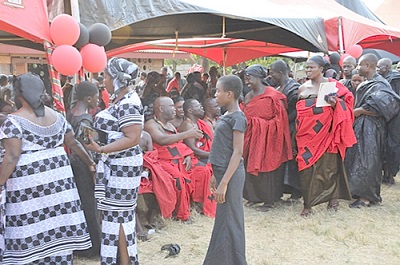![]()

Funerals and the bigger lessons for Ghanaians
In one of the tributes, the sequence of events leading to the death was narrated. I felt as if I was sitting in a mortality audit as we do routinely in my hospital.
Advertisement
The particular death seemed preventable from the narration. It seemed to be one of the many 'system failures' in our country. The lack of proper emergency services in many of our (smaller) health institutions.
Many thoughts came to my mind that day. Since then these questions come to my mind when I am at a funeral:
1. What was the cause of death?
2. Was this death preventable?
3. How many people at this funeral will benefit if they knew the cause of death and the preventive measures? I have sat in thousands of audits of mortalities as a medical doctor.
Many deaths in our part of the world are preventable.
Ranging from personal factors (e.g. lack of health seeking behaviour, lack of funds/poverty) to institutional factors (like poor emergency response, lack of qualified personnel, equipment and tools, even blood in our blood banks) to national factors (like flaws in the National Health Insurance Scheme), Ghanaians will appreciate things better if they got to know the causes of death of their close relatives and friends and what can be done to prevent these deaths.
Friends and relations may share common risk factors that predispose them to the same conditions that killed those whose funerals they attend.
While it may not be practical nor ethical to divulge the cause of death to everyone, I think close relations who can get the cause of death may have to get it and act.
A couple of years ago, the American actress, Angelina Jolie, opted for a 'prophylactic mastectomy'. She decided to have her breasts removed because some tests showed that she was at risk of breast cancer.
Her close family members may carry this same risk. Choosing the operation was difficult. Going public about it was also difficult, but it was hoped that other women may benefit from the knowledge.
It is difficult in Ghana to explain this to many families including children of the deceased.
Many families decline autopsies because they think 'the death of the person is the end of the story. We should let sleeping dogs lie.' I encounter this often as a medical doctor in the district.
The truth is, findings at autopsies may save the lives of other family members, if well handled. Where the cause of death is due to 'systems failure' in institutions or nationally, a concerted effort to address this may prevent many such deaths.
This may take the form of community mobilisation to regularly donate blood to the blood bank of the district hospital or a national cervical cancer screening programme.
How many women have attended funerals of women who died from cervical cancer without knowing the cause of death and the fact that vaccination of girls and boys and screening of women like themselves could prevent deaths from cervical cancer?
While we mourn our dead, we should reflect on issues that could save lives.
The writer is a gynaecologist at the Catholic Hospital, Battor in the North Tongu District of the Volta Region of Ghana.





